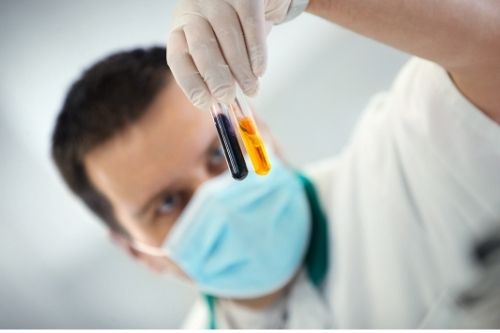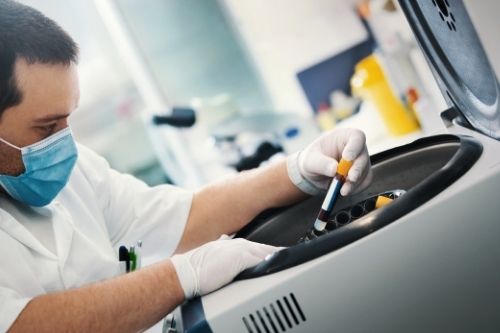Table of Contents
Medical lab technicians/technologists are critical components of the whole healthcare system since they collect samples, test, report, and document medical investigations. They examine the cells, tissues, and fluids of the body using biochemical, pathological, and microscopic techniques. This program prepares students for a rewarding job in a hospital, minor emergency centers, private laboratories, blood donation centers, clinics etc. Continue reading to learn how to start a career as a medical lab technician.
Medical Lab Technician: Overview
The Medical Lab Technician is certified in the diagnosis of various illnesses as well as the operation of electrical and electronic lab equipment. Training on how to keep patient records and track progress is essential. Among the responsibilities are:
- Extraction and Examination of all body fluid samples, and analysis of those fluids.
- Examining various bodily tissues, sample gathering and preparation procedures, staining, and microscopic inspection.
- Examining various blood cells and identifying any alterations or disease.
- Biochemistry tests determine the composition of the blood, hormones, enzymes, and medication levels.
- Blood grouping and crossmatching in the event of a blood transfusion in an emergency or trauma situation.
- Microbiological detection of pathogens that affect the human body, including all viruses, bacteria, and other disease-causing pathogens.
- Body fluid analysis, blood banking, immune system research, hematology, phlebotomy, microbiology, human tissue research, urine analysis, parasitology, serology, and other areas are covered by lab technicians, who work under the supervision of experienced pathologists and perform routine laboratory testing manually.
Medical Lab Technician: Course Details

Medical laboratory technology students can pursue courses at both the diploma and degree levels. Various medical colleges/institutions around the country offer the B.Sc. program in medical laboratory technology. The degree conferred is a B.Sc.-M.L.T. A qualification of 10+2 with scientific courses or equivalent from a University or Board is necessary for B.Sc. Medical Laboratory Technology (BMLT). The course is three years long. Other certificate programs for lab technician professions require 10+2 with scientific studies. These courses are provided by Colleges, universities, and hospitals. Generally the Hospitals associate with a college or university.
Curriculum
Human body – Anatomy and Physiology of the Human body delve into the chemistry and physics of the human anatomy’s structures and how they interact to sustain life’s activities.
Medical terminology – It is the study of the words that we can use to describe the human body. The words are often made up of four parts: the root word, a prefix, a suffix, and a combining form, which serve as the foundation of medical language.
Medical law and Ethics: Rights and obligations of medical practitioners and their patients, as well as confidentiality, negligence, and criminal law. Examining a specific situation, generally a clinical case, and utilizing values, facts, and reasoning to determine the best course of action is what medical ethics is all about.
Medical emergencies: This includes an emergency medical response, disaster preparedness, and medical control planning, oversight, and administration.
Biochemistry, both fundamental and applied: This is the study of biological processes at the cellular and molecular levels using chemistry.
Hematology, Immunology, and Serology: Hematology is the study of disorders affecting the blood and blood components, such as blood and bone marrow cells. Immunology and serology research focuses on the identification of antibodies, the investigation of immune system issues, and the determination of organ, tissue, and fluid compatibility for transplantation.
Microbiology (bacteriology, mycology, virology, parasitology) is the study of unicellular, multicellular, or acellular microorganisms. Microbiology is divided into several subfields, including virology, bacteriology, protistology, mycology, immunology, and parasitology.
Clinical pathology is the diagnosis of disease by the use of laboratory testing of blood and other body fluids, tissues, and microscopic examination of individual cells.
Pre-analytical and post-analytical lab procedures- Pre-analytical variables occur before real specimen testing, and post-analytical variables exist after a test result is obtained.
Medical Lab Technician Job Opportunities

- Medical lab technicians work in hospitals, labs, diagnostic centers, and nursing homes to help conduct tests, operate with lab equipment, and record results and data.
- Private testing Laboratory in collaboration with a pathologist to confirm pathology results.
- You can work as an educator or tutor in academic institutions such as Medical colleges, private colleges and universities etc.
- There is a huge scope in Medical writing for Lab Technicians, You can write
scientific publications such as clinical research papers, material for healthcare websites, health periodicals, journals, and news.
Takeaways
A career as a lab technician requires someone who is not afraid to work with body fluids, tissue, or injuries.
They Should be able to put in long hours in Operations Theater (OT) Techs, Optical Lab Techs, Plaster Techs, Renal Dialysis Techs, and Physiotherapy
Lab Technicians must have a love for dealing with patients since these roles demand a lot of time spent talking with patients through uncomfortable and occasionally painful treatments. In that regard, the medical technician must have patience and compassion for others.
A Lab technician must also be exceptionally organized (to avoid lab mix-ups) and have great writing and spoken communication skills. Moreover, they should know how to interact with both patients and be very detail-focused.
Finally, a Medical Lab Technician must be analytical and scientifically oriented, as well as capable of following established scientific (as well as safety) standards and protocols on a regular basis.
We hope you enjoyed reading this blog post, if you have any doubts you can reach us here.
You can also leave a comment below and share your thoughts.
Liked this blog? Read next: Medical courses after 12th | Top 7 courses you must think about
FAQs
What exactly are MLT and DMLT?
MLT stands for Medical Laboratory Technology, whereas DMLT stands for Diploma in Medical Laboratory Technology. If you are specifically referring to M.Sc in MLT, it is a Master’s degree in the same field.
What is the average lab technician’s salary?
The average Laboratory Technician pay in the United States is $62,210, with a salary range of $54,453 to $73,383. Salary ranges can vary depending on a variety of things, including schooling, certifications, supplementary talents, and the number of years you have worked in your field.
What are the prerequisites for the Lab Technician course?
This program requires a minimum qualification of SSC with a minimum aggregate of 40%. For admission to the Lab Technician course, several universities provide standardized entrance exams.







This article is a great step-by-step resource for those who want to enter the field and pursue a career as a lab technician ohmjobs is a healthcare portal to find healthcare jobs